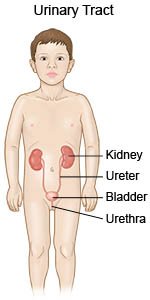Urinary Tract Infection in Children
Medically reviewed by Drugs.com. Last updated on Aug 4, 2025.
A urinary tract infection (UTI) is caused by bacteria that get inside your child's urinary tract. The urinary tract includes the kidneys, ureters, bladder, and urethra. Most UTIs happen in the lower urinary tract, which includes the bladder and urethra.
 |
DISCHARGE INSTRUCTIONS:
Return to the emergency department if:
- Your child has a high fever with shaking chills.
- Your child has severe pain in his or her abdomen, sides, or back.
- Your child urinates very little or not at all.
Call your child's doctor if:
- Your child has a fever of 100.4°F (38°C) or higher.
- Your child is not getting better after 2 days of treatment.
- Your child is vomiting.
- You have questions or concerns about your child's condition or care.
Related medications
Treatment options
The following list of medications are related to or used in the treatment of this condition.
Medicines:
The main treatment for a UTI is antibiotics. You may also be able to give your child medicine to help relieve pain or lower a mild fever. Talk to your child's healthcare provider about medicines that are right for your child.
- Antibiotics help treat a bacterial infection.
- Acetaminophen decreases pain and fever. It is available without a doctor's order. Ask how much to give your child and how often to give it. Follow directions. Read the labels of all other medicines your child uses to see if they also contain acetaminophen, or ask your child's doctor or pharmacist. Acetaminophen can cause liver damage if not taken correctly.
- NSAIDs , such as ibuprofen, help decrease swelling, pain, and fever. This medicine is available with or without a doctor's order. NSAIDs can cause stomach bleeding or kidney problems in certain people. If your child takes blood thinner medicine, always ask if NSAIDs are safe for him or her. Always read the medicine label and follow directions. Do not give these medicines to children younger than 6 months without direction from a healthcare provider.
- Do not give aspirin to children younger than 18 years. Your child could develop Reye syndrome if he or she has the flu or a fever and takes aspirin. Reye syndrome can cause life-threatening brain and liver damage. Check your child's medicine labels for aspirin or salicylates.
- Give your child's medicine as directed. Contact your child's healthcare provider if you think the medicine is not working as expected. Tell the provider if your child is allergic to any medicine. Keep a current list of the medicines, vitamins, and herbs your child takes. Include the amounts, and when, how, and why they are taken. Bring the list or the medicines in their containers to follow-up visits. Carry your child's medicine list with you in case of an emergency.
Prevent another UTI:
- Have your child empty his or her bladder often. Make sure your child urinates and empties his or her bladder as soon as needed. Teach your child not to hold urine for long periods of time.
- Encourage your child to drink more liquids. Ask how much liquid your child should drink each day and which liquids are best. Your child may need to drink more liquids than usual to help flush out the bacteria. Do not let your child drink caffeine or citrus juices. These can irritate your child's bladder and increase symptoms. Your child's healthcare provider may recommend cranberry juice to help prevent a UTI.
- Teach your child to wipe from front to back. Your child should wipe from front to back after urinating or having a bowel movement. This will help prevent germs from getting into the urinary tract through the urethra.
- Treat your child's constipation. This may lower his or her UTI risk. Ask your child's healthcare provider how to treat your child's constipation.
Follow up with your child's doctor as directed:
Write down your questions so you remember to ask them during your child's visits.
© Copyright Merative 2025 Information is for End User's use only and may not be sold, redistributed or otherwise used for commercial purposes.
The above information is an educational aid only. It is not intended as medical advice for individual conditions or treatments. Talk to your doctor, nurse or pharmacist before following any medical regimen to see if it is safe and effective for you.
Learn more about Urinary Tract Infection
- Antibiotic Resistance: The Top 10 List
- Antibiotics 101: Common Names, Types & Their Uses
- Antibiotics For UTI Treatment - What Are My Options?
- Antibiotics and Birth Control Pill Interactions
- Anticholinergic Drugs to Avoid in the Elderly
- Can You Drink Alcohol with Antibiotics?
- Common Side Effects from Antibiotics, and Allergies and Reactions
- Why Don’t Antibiotics Kill Viruses?
Treatment options
Care guides
- Interstitial Cystitis
- Kidney Infection
- Urinary Tract Infection in Children
- Urinary Tract Infection in Men
- Urinary Tract Infection in Women
Symptoms and treatments
Medicine.com guides (external)
Further information
Always consult your healthcare provider to ensure the information displayed on this page applies to your personal circumstances.
